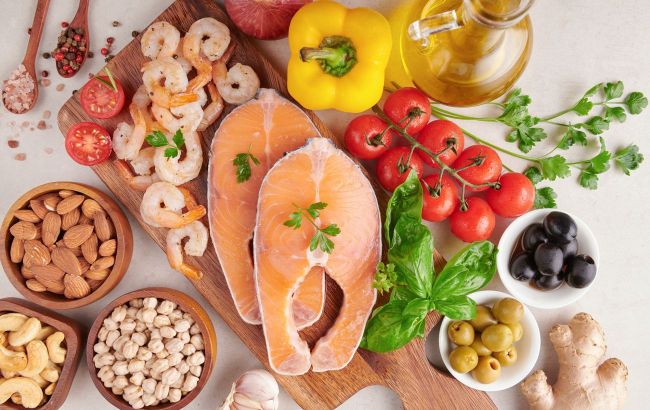6 foods to ease anxiety and depression
 6 foods to ease anxiety and depression (freepik.com)
6 foods to ease anxiety and depression (freepik.com)
We face various tasks every day. If you are accompanied by anxiety and depression, daily tasks can become seemingly impossible. It's especially obvious during periods of depression when physical activities, going for a walk, or even answering a phone call can be challenging.
How food affects mood and what to eat to reduce anxiety and depression, read on RBC-Ukraine referencing Real Simple.
How food affects mood
It may not be obvious, but food can significantly impact mental health and stress levels. Some foods can help reduce symptoms of anxiety and depression, especially those rich in compounds that combat oxidative stress and inflammation — two mechanisms behind mental health.
On the other hand, some foods can worsen anxiety, such as those high in inflammatory ingredients. Foods rich in nutrients beneficial to the gut (such as probiotics and fiber) can support your mood, as the gut microbiome and the brain are closely linked.
Food is not a substitute for treatment methods such as medication or therapy. However, it can help improve one's condition.
Foods that help reduce anxiety and depression
- Fatty fish
According to a doctor, psychiatrist, nutritionist, chef, and author of nutrition books, regular consumption of fatty fish (such as salmon and tuna) can support brain tissue health and mental well-being, potentially reducing anxiety and depression.
They are rich in omega-3 fatty acids, including eicosapentaenoic acid (EPA) and docosahexaenoic acid (DHA), which are highly beneficial for the brain. Both fats protect the brain from oxidative stress and inflammation associated with mood disorders such as anxiety and depression, as well as neurodegeneration (loss of nerve cells), which can lead to memory loss, cognitive impairment, and consciousness dimming.
Omega-3 is also found in plant foods such as walnuts and chia seeds. While not as well-absorbed as fats from seafood, they are a reliable alternative that benefits brain health.
- Fermented foods
These foods are beneficial for the gut, but they can also improve your mood thanks to the connection between gut health and brain health. According to Dr. Naidoo, fermented products like plain yogurt, kimchi, and tempeh contain live bacterial cultures known as probiotics.
They replenish the population of beneficial bacteria in the gut, helping balance the microbiome, resulting in reduced inflammation and improved production of neurotransmitters or chemical messengers that control mood.
- Leafy greens
Greens such as spinach, cabbage, and Swiss chard are brain-boosting foods. They are rich in nutrients that contribute to a healthy mood.
Noteworthy examples include polyphenols, vitamin E, and vitamin C, each of which possesses antioxidant and anti-inflammatory properties that can help alleviate mental health symptoms.
Moreover, vitamin C helps clear the body of excess cortisol, also known as the stress hormone. According to Dr. Naidoo, it can further ease feelings of stress and anxiety.
- Berries
A healthy gut equals a healthy brain! Many gut-friendly foods, including those high in fiber, are excellent for your head. Berries like strawberries, blueberries, and raspberries are prime examples.
These brightly colored fruits are rich in fiber, a nutrient that promotes microbial balance in the gut. This opens the door to better stress response, improved neurotransmitter regulation (including serotonin), and reduced levels of inflammation and oxidative stress, all of which can alleviate anxiety and depression.
Besides, berries are rich in powerful antioxidants called anthocyanins. These compounds, also natural pigments giving berries their cult-favorite purple-blue hue, support a healthy mood by regulating inflammation, controlling signals between neurons, and balancing the gut.
- Oysters
Oysters are another excellent food for combating anxiety and depression, thanks to their sky-high zinc content, a crucial mineral. Zinc regulates the levels of gamma-aminobutyric acid (GABA) and serotonin neurotransmitters, which are crucial for mood and stress regulation.
Adults need about 11 milligrams of zinc per day, while one medium-sized oyster contains about 5 milligrams. It means that consuming just two or three oysters a day can help you get enough zinc.
If oysters aren't to your liking, you can obtain zinc from other shellfish such as crab or lobster, as well as from legumes, nuts, and beef.
- Dark chocolate
Dark chocolate is another mood-boosting product, and not just because it's delicious. These treats are rich in antioxidant polyphenols, which have been proven to support the brain by controlling neuroinflammation and enhancing neurogenesis (making new neurons).
Dark chocolate also exerts a prebiotic effect on the gut, meaning it feeds bacteria, ultimately contributing to mental health through the gut-brain interaction.
In addition, dark chocolate is a source of magnesium, a nutrient that helps calm the central nervous system and reduce anxiety.
This material is for informational purposes only and should not be used for medical diagnosis or self-treatment. Our goal is to provide readers with accurate information about symptoms, causes, and methods of detecting diseases. RBС-Ukraine is not responsible for any diagnoses that readers may make based on materials from the resource. We do not recommend self-treatment and advise consulting a doctor in case of any health concerns.

